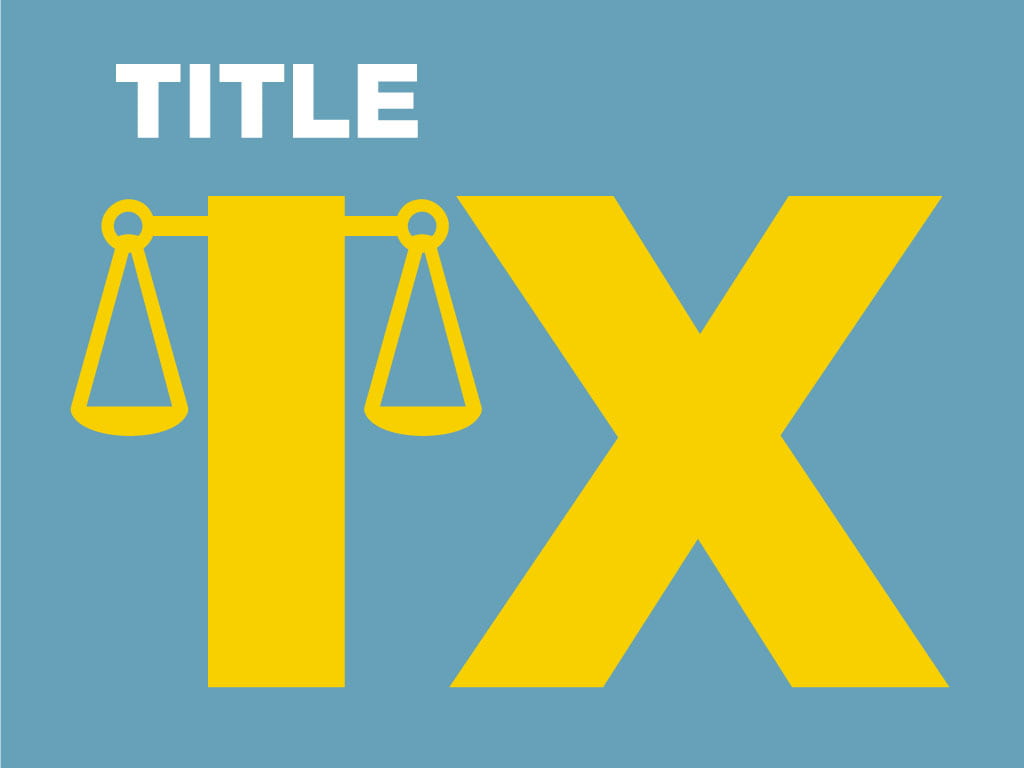Talking Title IX with the Title IX officer
Tierney Anderson explains how the landmark law affords access and protections to the campus community

Since this month is the 50th anniversary of Title IX, why not speak to the only person at UCI with the landmark law in her title? Tierney Anderson is the Title IX officer at UCI. Title IX is situated in the Office of Equal Opportunity & Diversity, which is responsible for the university’s compliance with federal and state laws and university policies and procedures regarding discrimination, retaliation, sexual harassment and sexual violence. OEOD is a neutral office that promotes and integrates the principles of equal opportunity, affirmative action and nondiscrimination at UCI. The office serves both the campus and UCI Health, including the medical center. In this Q&A with UCI News, Anderson explains how several of Title IX’s important provisions are implemented at UCI.
What does a Title IX officer do?
An important part of my role is to coordinate the university’s response to all reports of discrimination, sexual harassment and sexual violence made to the campus or medical center by students, staff, faculty, volunteers and patients, manage the education and training for the UCI community, and deliver programs and resources. OEOD provides consultations, informally resolves concerns, conducts formal investigations and responds to federal and state agency inquiries on behalf of UCI. OEOD handles all reports of sex-based discrimination under Title IX, but also all other 18 protected bases. I also work to advance gender equity in University programs, including our athletics program.
How does Title IX apply to the work you do?
Title IX is a 37-word law prohibiting discrimination on the basis of sex. Over time, the law has been interpreted to include more protections for more people. For instance, it was originally perceived as a gender-equity law, focused on a male-to-female ratio of faculty positions, graduate programs, and athletics, later expanding to pregnancy and post-pregnancy protections and sexual harassment concerns; and then incidents of sexual violence including sexual assault, stalking, relationship violence, sexual exploitation and invasions of sexual privacy; and most recently, expanding protections for sexual orientation, gender expression and identity. Additionally, over the last few years, we’ve seen Title IX applied more frequently in the clinical context, between healthcare providers and their patients.
Of all the types of discrimination and harassment complaints received yearly at UCI, sexual harassment is still the most reported concern to OEOD.
How do you work with students to educate them on Title IX compliance?
We partner with Campus Assault Resources & Education to deliver prevention education programs, particularly with incoming students who are away from home for the first time, student-employees like resident assistants in housing – who are often the first people students turn to for questions or support – and our student-athletes. As an institute of higher education, we also provide a lot of one-on-one education on the policy and individualized training to students when issues are reported to OEOD. We will also develop and deliver new programs tailored to individual and group requests including various student groups and organizations in partnership with Student Affairs.
How do you work with UCI Athletics?
We have fantastic partners in UCI Athletics that help maintain our compliance in gender-equity work, but we also partner on other larger initiatives such as the implementation of the new changes to the NCAA Sexual Violence Policy and the creation of a trans student-athlete policy. In the last few years, we’ve also worked with athletics to implement the UC clinical guidance for responding to sexual misconduct complaints arising in an athletics clinical setting.
What are some of the misconceptions of Title IX?
There are a few misconceptions I see regularly. One of the biggest misconceptions nationwide is that Title IX applies only to athletics.
The most frequent misconception on campus is that all reports OEOD receives will result in a formal investigation. In reality, a small portion of what OEOD does is conduct formal investigations. Most people who engage our office have questions, want to consult or want assistance to informally resolve their concerns. Our students and employees can receive supportive measures without a formal investigation, for instance, to help with emergency housing or housing relocation for an issue of stalking, or academic support when a sexual assault occurs. Often what leads an individual to the Title IX office is that there has been a situation in which that individual’s power has been taken away. Part of our response is to try and give some of that power back and let them dictate which process, if any, OEOD will take to resolve their concerns. Complainant agency is very important as long as there isn’t a greater campus or medical center significant safety concern. We really let individuals choose how they want to proceed. In the cases in which there is a formal investigation, there is quite a bit of transparency in that process for the parties involved, although their privacy is important, so until an investigation is complete, broader notifications will likely not be made to the campus community.
Additionally, a large portion of our work is about taking lessons from cases and trends we see and figuring out better ways to support our community of students, employees and patients, including creating new trainings and resources. For instance, this past academic year we saw a need to create a new alternative training for our researchers, both students and employees, who are doing incredible work in remote field settings and who may navigate different challenges when faced with discrimination or sexual harassment than being in a campus academic setting.
Overall, with Title IX, we’ve seen an expansion to the resources, services and options provided to individuals, but we’ve also experienced the swing of the pendulum as federal regulations have changed and become more complex in the last few years. This has created some challenges for implementation and misconceptions of what a Title IX process means, so it’s been important to ensure UCI’s overall compliance with federal regulations, while also making sure our university community understands their rights and can make best decisions for themselves within those changing mandates.
How important has Title IX been?
So important. Title IX created a foundational premise for establishing an equitable and fair environment, and the way it has been implemented over the years keeps becoming more and more expansive and impactful to more folx. It’s not just about gender equity and numbers, but what resources and processes should be provided as options for people if they experience discrimination and in spaces not just in education but also employment and patient care. In the area of sexual violence, for so long law enforcement was the only avenue, and now there are so many more ways to resolve complaints and support and accommodations are far more extensive. I’ve also seen an expansion in interest from external agencies, including federal and private funding agencies, particularly in STEM to help ensure institutions are following best practices for preventing and responding to sexual harassment. I see this as a positive trend in a collective responsibility and support to appropriately prevent and respond to sexual harassment and move toward elimination of sex discrimination in the academy.
Anything else?
UCI’s Title IX program is long standing and, unlike other campuses, is a single neutral office for prevention, education and response to all issues of discrimination and sexual harassment for all members of the UCI campus and health communities. Although I am relatively new to this role, our Title IX Office has enjoyed incredibly stability and support over the past few decades from our current and former Chancellor’s leadership. In addition to a single office approach, we had the longest sitting Title IX officer in the UC system, Kirsten Quanbeck (UCI’s vice chancellor of equal opportunity & compliance who oversees OEOD), whose oversight, institutional knowledge and compassionate approach has been instrumental to UCI’s response and growth in the Title IX space.
If you have witnessed, experienced or been informed of an act of sexual harassment, sexual violence or discrimination on the UCI campus, in UCI Health clinics or at the UCI Medical Center, please report it to the Office of Equal Opportunity and Diversity, the UCI Police Department, or both. This site provides more information: https://oeod.uci.edu/harassment_guide/report.php

